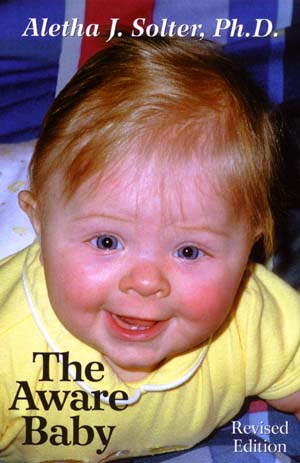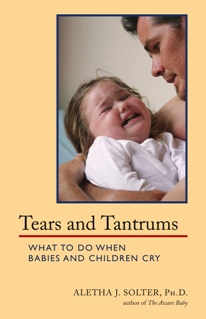How to stop a toddler from biting
by Aletha Solter, Ph.D.
Question:
My one year old bites constantly. I haven't been able to come up with anything to stop this behavior. Sometimes he bites for no reason, but most of the time it's out of frustration. Whenever he doesn't like something he tries to bite. My 3-year-old is often the target. He also bites other children in church. I worry he that may seriously hurt someone. I feel frustrated and don't know what to do. Please help!!!
Answer:
Biting behavior is common in toddlers, and it is often an indication of stress, anxiety, or frustration. It can also be caused by unhealed trauma from the past. When you understand and address the underlying reasons, it is usually possible to eliminate biting entirely. Here are some suggestions:
Suggestions for ways to prevent biting:
1. You can begin by looking for sources of stress and frustration in your son's life. Are his days too over-stimulated? Has he seen frightening scenes on TV or videos? Is there anger, anxiety, or depression in your family? Do you have relationship problems with your partner? Children are sensitive to all of these possible sources of stress, and their biting behavior usually indicates that they are feeling stressed. You did not mention your approach to discipline, but this is another important consideration. Authoritarian approaches can be very frustrating for children, causing them to be aggressive. When you need to set limits or get your son to cooperate, a positive approach to discipline will not only be more effective, but will avoid contributing to your son's frustration and anger.
2. Sometimes toddlers who are frequently around older siblings (or older friends) feel chronically powerless and frustrated. They use biting as a way of asserting themselves. Give your son opportunities to play with children who are slightly younger than he is, so he will have some experience with a different social situation in which he is more capable than the other child.
3. Arrange to spend some time alone with each of your children every day (or at least once a week), giving them individual attention. This will help to reduce any feelings of jealousy towards each other, which may be contributing to the biting problem.
4. Help your three-year-old become aware of her behaviors that frustrate or upset her little brother, and help her learn to avoid doing those things. Also help her anticipate when he is likely to bite. Discuss a plan of action for those times. What concrete things can she do to avoid being bitten?
5. Biting behavior is more common in toddlers who have not had sufficient opportunities to cry and rage. I therefore recommend that you try to accept your son's temper tantrums and crying spells whenever they occur. Crying and tantrums are healthy outlets for frustration. The more tensions he releases through crying and raging, the less likely he will be to bite. Avoid punishing or distracting him away from his attempts to cry or rage, and don't use time-outs. When he has a meltdown, stay close to offer him your love and support. After the crying or raging has run its course, he will probably be calm and gentle.
What to do after he has bitten another child:
When your son bites another child, say firmly: "No biting. Biting hurts." Help him to understand why the other child is upset or crying. After the victim feels better, talk to the two children and use mediation to help discover the source of the immediate problem that triggered the biting. With children this young, your mediation will consist of guessing what you think each child was feeling and needing, and helping them find a solution. For example, was he feeling excluded? Did another child push him or take a toy away from him? Was he trying to accomplish something too difficult? You can say, for example, "Were you angry because you saw Tommy playing with that truck, and you wanted it? Let's find another one for you to play with."
You can also look for other immediate causes that may be contributing to his behavior. For example, is the room too crowded? Is he hungry, tired or over-stimulated? Is there insufficient adult supervision? Before leaving him in the church nursery or other situation, be sure he is comfortable being there without you. If he misses you, this anxiety could contribute to his biting behavior.
It may be necessary for you to remove your son physically from the situation, but to stay with him and hold him until he feels better and is ready to play gently with his sister or with other children in a group setting. Removing him from the situation may provide him with a pretext to start crying, and this crying will be beneficial and healing for him, provided you stay with him to offer love and support. Furthermore, this time-out together will provide him with an opportunity to reconnect with you, both physically and emotionally.
By following these suggestions, your son's biting behavior will probably decrease. However, until he stops biting, you will need to supervise him closely when he is with other children, to protect them from being hurt.
About Aletha Solter:
Aletha Solter, PhD, is a developmental psychologist, international speaker, consultant, and founder of the Aware Parenting Institute. Her books have been translated into many languages, and she is recognized internationally as an expert on attachment, trauma, and non-punitive discipline.
Aware Parenting is a philosophy of child-rearing that has the potential to change the world. Based on cutting-edge research and insights in child development, Aware Parenting questions most traditional assumptions about raising children, and proposes a new approach that can profoundly shift a parent's relationship with his or her child. Parents who follow this approach raise children who are bright, compassionate, competent, nonviolent, and drug free.
For more information about aggressive behavior in babies and toddlers, see Aletha Solter's books, The Aware Baby and Tears and Tantrums.

